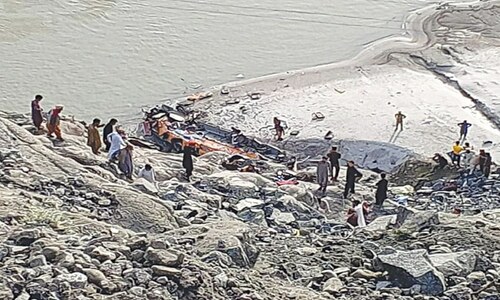ISLAMABAD, May 22: The Annual Plan Coordination Committee (APCC) on Monday decided to forward next year’s Public Sector Development Programme (PSDP 2006-07) of Rs350 billion for approval by the National Economic Council along with a request to boost its size to meet some provincial demands.
In addition, an amount of Rs15 billion would be set aside to set up the Khushal Pakistan Fund and Rs10 billion more for the first and second phase of the Khushal Pakistan Programme, swelling the size of the KPP to Rs25 billion for district level schemes.
But Dr Akram Sheikh, deputy chairman of the Planning Commission said that PSDP’s size would become clear on Tuesday when final calculations would be made after prioritising various schemes cleared at the APCC meeting, keeping in mind overall resource availability.
It was the first time that the APCC did not discuss the current year’s annual plan or next year’s projections for macroeconomic framework, including growth rates, although both were leading items on its agenda.
Dr Sheikh said the annual plan and the macroeconomic framework would be finalised by the National Accounts Committee before being presented to the National Economic Council (NEC) for approval.
Of the Rs350 billion, Rs100 billion would be allocated for ongoing provincial projects.
The sources said the final size of the PSDP might be as high as Rs400 billion as some of the projects had been included in the development programme on recommendations of the president and the prime minister at the NEC level.
The APCC also approved Rs42 billion for water sector projects, including Rs5 billion for acquisition of land for five major dams.
Dr Sheikh refused to allow inclusion of additional segments of the Subakzai dam and said the project was being deliberately delayed and he would brief the president and the prime minister on it so that people responsible for delaying the project could be taken to task.
Dr Sheikh said that he had urged the meeting participants to seek smaller allocations for new projects because new projects took a lot of time to take off, adding that new projects’ utilisation rate was only 18 per cent in the first year against 50 per cent of ongoing projects.
NWFP Minister for Finance Sirajul Haq protested over deletion of 11 road projects of the National Highway Authority from the next year’s PSDP.
He said that the deputy chairman had agreed to accommodate NWFP road projects in the next year’s development programme.
M.A. Jalil, Sindh Chief Minister’s Adviser on Finance, said the centre would no longer provide funds for provincial projects, adding that the funds would be diverted for development of big reservoirs and centre’s direct projects in the provinces.
He said the centre used to fund provincial projects on 50:50 basis. However, the ongoing provincial projects and those already approved by the ECNEC and CDWP would continue to be funded by the federal government.
He said he had taken the stand that provincial projects announced by the president and prime minister from time to time should be fully funded by the federal government because the province did not have enough fiscal space to provide funds for federal projects. The centre agreed, he said.
He said he criticised the National Highway Authority for not initiating any new road development projects while having collected toll tax for many years. He said the Planning Commission’s deputy chairman had agreed that funds for approved projects should be provided without any delay.
Sources said that Sindh and Punjab had criticised Wapda and the Ministry of Water and Power over power breakdowns and for not taking them into confidence about village electrification.
Dr Akram Sheikh directed Wapda and the power ministry to assess village electrification needs in consultation with provincial governments.
Wapda authorities informed the APCC that there would be no addition in power generation capacity over the next five years and the country currently faced a shortage of six per cent and 12 per cent in domestic and industrial power supply, respectively.
Sindh’s representatives also criticised Wapda for discouraging a Chinese company from investing in the Thar coal project as it did not agree to pay more than 5.4 cents per unit power generation against a demand of 5.7 cents but later agreed to over seven cents per unit for wind energy.
Dr Akram Sheikh said he had been disappointed by the water and power ministry’s attitude towards alternate sources of energy and asked Sindh to prepare a case which he would personally take up at the higher forum for punitive action.
Dr Sheikh also criticised the petroleum ministry when a senior joint secretary of the ministry failed to inform the APCC about separate survey needed for identification of mineral deposits.
At this, he said the project for satellite geological survey, an aerial magnetic survey and other surveys for mineral exploration should be launched immediately to attract international investors and said a case be submitted for the NEC in which he would seek punitive action against the petroleum ministry’s inefficiency.














































Dear visitor, the comments section is undergoing an overhaul and will return soon.